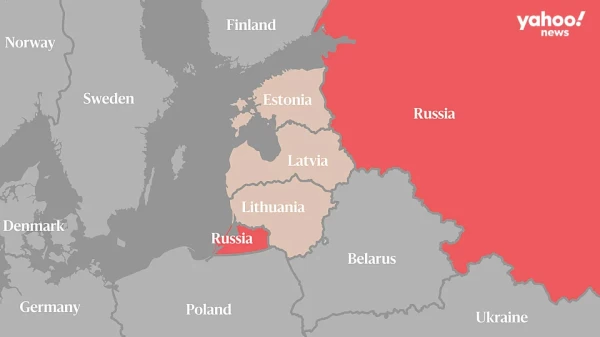Several news organizations have obtained confidential documents drawn up by the Kremlin that reveal Russia’s plans to exert its influence in Estonia, Latvia and Lithuania
Leaked documents were obtained by Delfi Estonia, Sweden’s Expressen, London-based Dossier Center, Latvia’s Re:Baltica, Lithuanian Public Broadcaster LRT, Süddeutsche Zeitung, German radio networks WDR and NDR, the Kyiv Independent, Poland’s FrontStory and Central European media outlet VSquare.
The strategies were created by the Russian Presidential Administration's Directorate for Cross-Border Cooperation, which previously drafted another document that revealed the Kremlin planned the incorporation of Belarus into a "Union State" with Russia by 2030.
According to the released information, the key issue for the Kremlin is to reduce the presence of the NATO military alliance in the former Soviet countries, while simultaneously strengthening Russian influence and culture. The documents state that associations and organizations should be created that can covertly advance pro-Russian narratives and spread Russian culture. Propaganda should allege discrimination against Russian speakers and Russian-speaking students should be invited to Russia. Meanwhile, the demolition or relocation of Soviet-era World War II monuments should be prevented.
In Estonia, lucrative business contracts should be offered to businessmen, one document states.
"Work with Estonian businessmen to explain the readiness of the Russian Federation to open the Russian market to them, provided that Tallinn changes its foreign policy to be more pro-Moscow," it said.
According to Expressen, one strategy document suggests that Russia intends to use the dependence of the Baltic states on its electricity grid as leverage by pointing to the risk of Estonia, Latvia and Lithuania being disconnected from Russia's electricity grid.
The Baltic states are part of BRELL, an electrical power grid controlled by Moscow. However, the countries are preparing to synchronize their systems with continental Europe at the beginning of 2026.
A document on Lithuania states that Russia will create "conditions under which the Lithuanian leadership will be forced to recognize the potential damage to its national security from the build-up of NATO's military presence in the region."
Lithuania should be blocked from receiving air defenses that are linked to NATO, while the "number and scope of NATO's operational and combat training activities" in the country should be reduced, the document states.
Darius Jauniškis, head of Lithuania's security service, told Expressen that Russia often attempts to use its military power to pressure other nations.
"Russia's goal is to convince the international community that it is ready for military confrontation, if its demands are not heeded," Jauniškis said.
The Kremlin's plans in Latvia mention the "containment of NATO" and the creation of a school at a Russian institution in the capital, Riga, "which will become a center for strengthening the position of the Russian language, literature and culture" by 2025.
By 2030, the Russian language should be consolidated as a state language, it says.
Yahoo News notes that both Estonia and Latvia have recently adopted language reforms that will eventually result in the prohibition of Russian-language teaching in kindergartens and schools. To counter such efforts, Russia’s Estonia strategy directly calls for the “propaganda of Russian culture,” including the cultivation of children and the training of “talented Russian-speaking youth” in Russian universities.
Another explicit aim of the Russian documents is to prevent “the establishment of NATO military bases” in Latvia and Lithuania. National air and army installations in the Baltic countries host troops and units from NATO allies on a rotating basis.
In February, Estonia's foreign intelligence service said it believed Russia could exert "credible military pressure" on the Baltic states. It assessed that Russia considers them to be "the most vulnerable part of NATO."
This "would make them a focus of military pressure in the event of a NATO-Russia conflict," the intelligence service said.
A different European intelligence official, who is aware of the documents, said it was very unlikely that the authors were aware of the forthcoming invasion of Ukraine, given how remote the prospects for success of their schemes now look in hindsight.
Europe is far more united against Russian influence than it was before the attack on Ukraine. All three Baltic states have poured hundreds of millions of dollars of military aid into Ukraine, making them per capita the three largest contributors to Ukraine’s defense, whose struggle they see as a bulwark against the Kremlin’s designs for their own countries. Estonia alone has spent $440 million on military assistance for Ukraine, more than 1% of its gross domestic product.
The next goal in the documents is the creation of the conditions for “weakening the influence of the Western countries in the military-political, trade-economic and humanitarian spheres” and “counteracting the attempts of anti-Russian Estonian political forces to falsify history.”
A short-term goal for Estonia is the “formation of new public structures, foundations, NGOs and NGOs advocating cooperation with the Russian Federation.” Another short-term goal is working “with Estonian businessmen to explain the Russian Federation’s readiness to open up the Russian market to them, provided that Tallinn changes its foreign policy to be more pro-Moscow.”
As a whole, the Kremlin’s designs on the Baltics reflect time-tested Soviet tactics, Marius Laurinavičius, a Lithuanian expert on international affairs, told Yahoo News. “This is the old KGB method: ‘We should weaken our enemies. And the best way to weaken them is from inside, not from outside.’ What they are good at is dividing societies, creating problems, creating conflicts.”
Toots, the deputy director of Estonia’s intelligence service, thinks the plans feature exactly the same kind of delusional thinking and hubris, predicated on poor intelligence and false premises, that led Russia to believe it could quickly sack Kyiv over a year ago. “Knowing how the Russian regime operates,” he said, “I can say that the employees there have a habit of lying to their bosses because the bosses don’t like to receive unvarnished accounts of the real situation. If you provide them with embellished stories, you will live in an illusion. The Russian system is built on everyone bluffing.”
Russia's plans to control Baltics revealed (5)
Eestlased Eestis | 26 Apr 2023 | EWR
Viimased kommentaarid
Kommentaarid on kirjutatud EWR lugejate poolt. Nende sisu ei pruugi ühtida EWR toimetuse seisukohtadega.
Russians will be next time in collaps, made himself again. Pray!
Plans have been made. Question of time. Unite. With other Baltics. Pray.
The Baltics would be next in line, after a Russia occupies Ukraine.
That's why Estonians should help Ukraine in every way possible!
That's why Estonians should help Ukraine in every way possible!
Eestlased Eestis
TRENDING

























